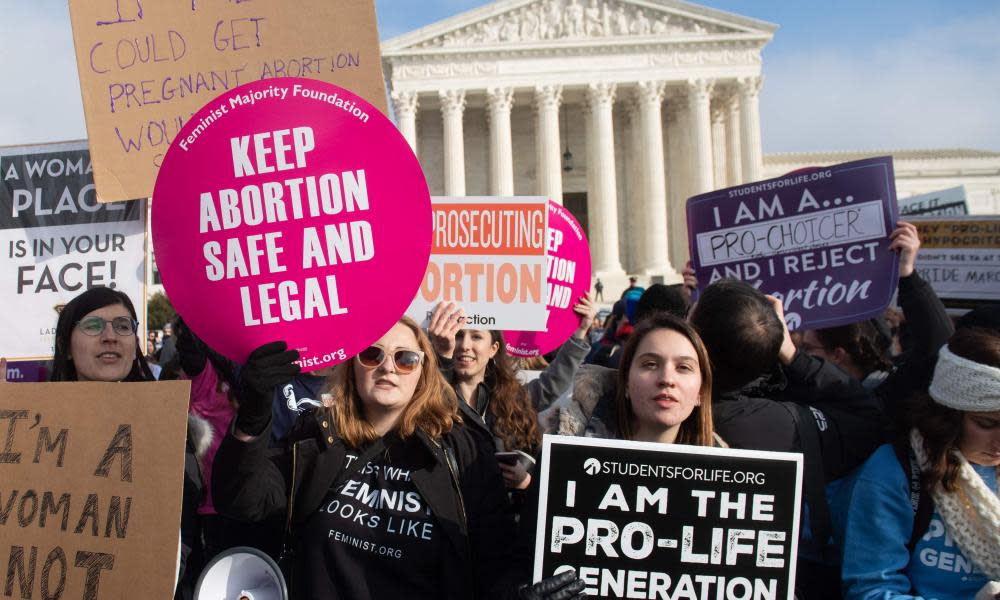Abortion rights case is first test for right-leaning US supreme court

The US supreme court, and its new conservative majority, will hear one of the most consequential abortion rights cases in decades. Oral arguments in the case, called June Medical Services LLC v Russo, take place Wednesday morning.
The case represents the first test for how the nine-member court, which has swung towards the right, will handle a high-profile reproductive rights case.
The case hinges on whether doctors performing abortions at standalone clinics should be required to have “admitting privileges” at local hospitals. If such a law were upheld, it could close abortion clinics across the country, and severely limit women’s access to the procedure, without improving women’s health in the process.
Already, the case in question breaks with precedent. The supreme court rarely takes cases similar to recent rulings. Oral arguments Wednesday will focus on a law identical to one the court overturned just four years ago.
“Laws regulating abortion should be evidence-based and supported by a valid medical justification. This law is neither,” said Dr Maureen Phipps, the CEO of the American College of Obstetricians and Gynecologists, the nation’s largest association of women’s health specialists. “We want the supreme court to understand there is no medical reason for this restriction and there is no patient safety benefit to this law.”
Attorneys for the case will answer questions from the nine justices for one hour. Justices will have the rest of the spring to review briefs, and issue a ruling in June. There is no limit on how broadly or narrowly the court may rule.
Related: US abortion rights hang by 'dangerously thin' thread, pro-choice advocates warn
This is the most anticipated abortion rights case since 1992, when the court upheld abortion rights with some new restrictions in a case called Planned Parenthood v Casey. What has changed since then is not public opinion, but the court itself. A justice who was considered a swing vote on reproductive rights was replaced by conservative Trump nominee Justice Brett Kavanaugh, after a bruising confirmation fight.
Abortion was legalized in the United States in 1973, with the landmark case Roe v Wade. Reproductive rights, and abortion in particular, have since become a clarion call for the religious right. Leaders have demanded an end to abortion since the late 1970s, in spite of popular support for abortion and other reproductive rights.
The latest case, June Medical Services v Russo, stems from a law in Louisiana called HB 620. The law required doctors who perform abortions at clinics to have “admitting privileges” at hospitals within 30 miles.
Under the law that's at issue in SCOTUS Wednesday, 71% of people seeking abortion care in Louisiana will have to travel more than 150 miles to get an abortion https://t.co/W52KFUEMCD
— Women's Law Project (@WomensLawProj) March 2, 2020
Such privileges allow a doctor to admit patients for treatment, but are difficult to obtain. Doctors who have them are typically employed as members of hospital staff. In rural settings, a clinic may be more than 30 miles from the nearest hospital.
Finally, in America’s private healthcare system, hospitals operate independently and are sensitive to the political concerns of the community. Many actively avoid connections with abortion clinics or doctors who perform them, and won’t grant the doctors the admitting rights they need to continue performing abortions.
If admitting privileges sounds familiar, it is because the supreme court heard a nearly identical case in 2016 from Texas, called Whole Woman’s Health v Hellerstedt. In that case, an evenly split court (four liberal, four conservative, and a swing vote) overturned such requirements.
Proponents claim admitting privileges improve safety for women, contrary to evidence established in appeals courts.
In 2016, a majority supreme sourt justices found admitting requirements conferred no medical benefits to women, and put substantial obstacles in the way of exercising the constitutional right to terminate a pregnancy. When the requirement was first passed in Texas it led to the closure of about half of the state’s abortion clinics, shuttering 20 of roughly 40, according to the American Bar Association. There are now only three abortion clinics in Louisiana,and if the law stands, it could close all but one.
In the June Medical Services case, the government also asked the justices to weigh in on a less high-profile question: should doctors be able to sue states that pass abortion restrictions, on behalf of their patients? Doctors have been able to sue on behalf of women seeking abortions since at least the 1973 Roe v Wade landmark.
The question is a matter of what is called “standing”, or rights to sue, in legal communities. If justices find doctors cannot sue on behalf of women seeking abortions, it could make it far more difficult to challenge even patently unconstitutional anti-abortion laws.

